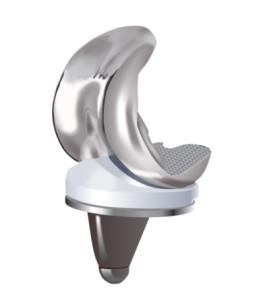Zimmer LPS-Flex Knee

Many of the Zimmer knee replacement products, including the LPS-Flex Knee, soon began to cause complications. Patients who used the Zimmer LPS-Flex Knee often experienced loosening of components. Revision surgeries were required to correct problems, leaving patients in significant pain and facing large medical bills.
In response to the problems, patients began to file lawsuits against Zimmer to obtain compensation for their losses.
If you or a loved one experienced complications as a result of a Zimmer-LPS flex knee or other Zimmer knee replacement products, you should consult with an experienced attorney at Roberts & Roberts to learn about your legal options.
About Zimmer LPS-Flex Knee Products
Zimmer LPS-Flex Knee products were brought to market under a special set of rules called 510(k) that allowed for minimal clinical testing and trials. Under 510(k) rules, the FDA fast-tracks approval with minimal oversight for products and medical devices that are substantially similar to those already approved and being sold.
The LPS-Flex Knee products were marketed as an option for active patients who required a total knee replacement surgery. Generally, in a knee replacement surgery, a part of the quadriceps is detached from the patella to expose the front of the knee, including the end of the femur and the end of the tibia.
The ends of both the femur and tibia are cut into shape and the anterior cruciate ligament and cartilages are removed. A new joint is fashioned, typically from metal components, and the new joint is affixed to the femur and tibia.A polyethylene surface may be inserted into the tibia during the procedure so that the metal joint doesn’t have to bear the full weight.
While the surgical replacement can reduce pain in patients with damaged knee joints, the procedure does not restore full mobility. The Zimmer LPS-Flex Knee implant was intended to allow for more flexibility and to allow patients to more deeply bend their knees after the procedure.
The LPS-Flex Knee implant had a more extended round design, providing a better connection between the tibia and the femur when bending the knee. Manufacturers said this would allow patients to bend as much as 155 degrees as compared with most knee replacement joints, which allowed for bending of only around 125 degrees.
Younger and more active people were often advised to opt for the Zimmer LPS-Flex Knee products due to the broader range of mobility.
Complications and Problems with Zimmer Knee Replacements
Unfortunately, while the LPS-Flex Knee did allow for more bending as a result of its design, the design also resulted in the femur replacement component’s coming loose much more often and after a much shorter period of time.
The problem was already apparent by 2007 when 47 patients with the LPS-Flex system were evaluated by researchers.
The research revealed that:
- 27 of the 47 patients had experienced loosening of the femur replacement component after 32 months.
- 15 of the 47 patients required revision surgery on the knee replacement after an average of just 23 months.
- The more extensive bending the patients did, the more likely it was that the femur replacement component would come loose.
A broader follow-up study in 2010 involved an evaluation of 166 patients who had received 218 Zimmer LPS-Flex Knee implants between October 2001 and February 2005.
This study revealed that:
- Within 24 months of the surgical knee replacement, loosening of the femur replacement component had occurred in 30 knees.
- Fractures developed in two of the knees around the implants.
- Two of the knees were not stable.
- The extensor mechanism, a muscle group in the knee, failed in one case.
- Within 49 months of the surgery, seven knees needed to be replaced.
In Europe, the Federation of National Associations of Orthopaedics and Traumatology examined problems with the Zimmer LPS-Flex total knee replacement systems as well, reviewing data from March 2003 to September 2004. They produced a report in the Journal of Bone and Joint Surgery cautioning of a high rate of early femoral component loosening.
These are just a few examples of studies showing problems. With evidence of mounting trouble, Zimmer voluntarily recalled certain lots of the NexGen LPS-Flex GSF Femoral Components designed for women because the tibia replacement component didn’t fit correctly into the femur replacement component.
The problem was referred to as a non-conforming cam radius and centered on the internal post of the tibia replacement component, which didn’t fit correctly in the cam (the bar located in the replacement component for the femur).
Today, there are at least three Zimmer knee replacement systems that have been causing serious problems for patients. These include the Zimmer CR-Flex, the Zimmer LPS-Flex and the MIS Tibial component. With numerous studies and multiple recalls, patients who have had any of these types of Zimmer knee replacement products may be at high risk of having the joint fail, necessitating further medical procedures.
Compensation for Injuries from Zimmer Knee Replacements
Numerous plaintiffs have already taken action against Zimmer based on defective knee replacements. A multi-district litigation has also been formed to consolidate claims against Zimmer.
The defective medical device attorneys at Roberts & Roberts are currently investigating claims related to Zimmer knee replacement products. For a free, confidential review of your claim, call us today at 903-597-6000 or 903-597-6000 or contact us online. The call costs you nothing … It could mean everything.
Sources:
- New York Times – “Surgeon vs. Knee Maker: Who’s Rejecting Whom?”
- OrthopaedicProccedings – “Are High Flexion Activities After High-Flex Total Knee Replacement Safe?”
- Healio Orthopedics – “Range of Flexion After Primary TKA: The Effect of Soft Tissue Release and Implant Design”







